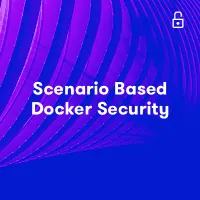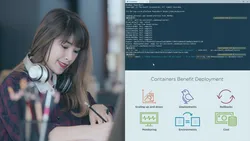![Docker Tutorial for Beginners [FULL COURSE in 3 Hours]](/ccsimg/td_book/check/dd5e61e0b65637f50fa75703046e5fda.webp)
Docker Tutorial for Beginners [FULL COURSE in 3 Hours] 
This course provides a comprehensive introduction to Docker, a containerization technology. It covers topics such as what Docker is, the differences between Docker and virtual machines, how to install Docker, and how to use it in practice. It also includes a demo project and debugging techniques. Learners will gain a thorough understanding of Docker and be able to use it confidently. ▼
ADVERTISEMENT
Course Feature
![]() Cost:
Cost:
Free
![]() Provider:
Provider:
Youtube
![]() Certificate:
Certificate:
Paid Certification
![]() Language:
Language:
English
![]() Start Date:
Start Date:
On-Demand
Course Overview
❗The content presented here is sourced directly from Youtube platform. For comprehensive course details, including enrollment information, simply click on the 'Go to class' link on our website.
Updated in [February 21st, 2023]
This course provides an introduction to Docker, a powerful tool for containerizing applications. It covers the basics of Docker, including what it is, how it works, and how to install it. It then dives into the main Docker commands, debugging a container, and developing with containers. The course also covers Docker Compose, Dockerfile, and private Docker repositories. Finally, the course covers Docker Volumes and how to deploy a containerized application. By the end of the course, students will have a comprehensive understanding of Docker and be able to use it to containerize their own applications.
[Applications]
After completing this course, learners can apply their knowledge of Docker to develop and deploy containerized applications. They can use Docker commands to debug and manage containers, and use Docker Compose to run multiple services. Learners can also build their own Docker images using Dockerfiles, and push them to a private Docker repository. Finally, they can use Docker Volumes to persist data in Docker.
[Career Paths]
1. DevOps Engineer: DevOps Engineers are responsible for managing the development, testing, and deployment of applications and services. They are also responsible for automating processes and ensuring that systems are secure and reliable. As the demand for cloud-based services increases, the need for DevOps Engineers is expected to grow.
2. Cloud Architect: Cloud Architects are responsible for designing and implementing cloud-based solutions. They must have a deep understanding of cloud technologies and be able to design and implement solutions that are secure, reliable, and cost-effective. As cloud computing continues to grow, the demand for Cloud Architects is expected to increase.
3. Container Engineer: Container Engineers are responsible for managing and deploying containerized applications. They must have a deep understanding of container technologies and be able to design and implement solutions that are secure, reliable, and cost-effective. As the use of containers continues to grow, the demand for Container Engineers is expected to increase.
4. Kubernetes Engineer: Kubernetes Engineers are responsible for managing and deploying applications on Kubernetes clusters. They must have a deep understanding of Kubernetes and be able to design and implement solutions that are secure, reliable, and cost-effective. As the use of Kubernetes continues to grow, the demand for Kubernetes Engineers is expected to increase.
[Education Paths]
1. Bachelor of Science in Computer Science: This degree path provides students with a comprehensive understanding of computer science fundamentals, such as programming, software engineering, and computer architecture. It also covers topics such as artificial intelligence, machine learning, and data science. This degree path is becoming increasingly popular as technology continues to evolve and become more complex.
2. Bachelor of Science in Information Technology: This degree path focuses on the application of technology to solve business problems. It covers topics such as systems analysis, database management, and network security. This degree path is becoming increasingly important as businesses rely more heavily on technology to stay competitive.
3. Master of Science in Computer Science: This degree path provides students with an advanced understanding of computer science topics, such as algorithms, distributed systems, and computer graphics. It also covers topics such as machine learning, artificial intelligence, and data science. This degree path is becoming increasingly popular as technology continues to evolve and become more complex.
4. Master of Science in Information Technology: This degree path focuses on the application of technology to solve business problems. It covers topics such as systems analysis, database management, and network security. This degree path is becoming increasingly important as businesses rely more heavily on technology to stay competitive.
Course Provider

Provider Youtube's Stats at AZClass
Discussion and Reviews
0.0 (Based on 0 reviews)
Explore Similar Online Courses

Scenario Based Docker Security

Understanding Convolution Kernels for CNNs! Computer Vision Basics Ep 2 What are convolutions?

Python for Informatics: Exploring Information

Social Network Analysis

Introduction to Systematic Review and Meta-Analysis

The Analytics Edge

DCO042 - Python For Informatics

Causal Diagrams: Draw Your Assumptions Before Your Conclusions

Whole genome sequencing of bacterial genomes - tools and applications

Managing Docker on Linux Servers

Fundamentals of Docker and Kubernetes for NET Developers


Start your review of Docker Tutorial for Beginners [FULL COURSE in 3 Hours]